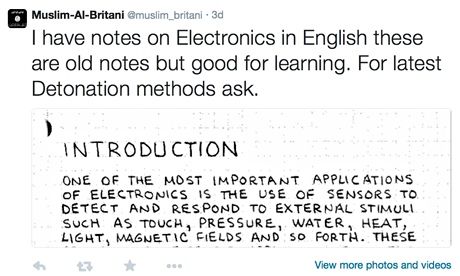
A man from the West Midlands who claims to be an explosives expert has told the Guardian he has joined Isis after fighting for the Taliban for several years.
Hamayun Tariq, 37, a car mechanic who became a jihadi, says he volunteered to fight for the militant group, known for inflicting ruthless violence on unarmed captives and civilians, seven weeks ago after spending the summer hitchhiking from Pakistan’s tribal belt.
He said that he was now “really happy” and receiving a salary and housing allowance from Isis.
During the last few days the self-declared bomb maker has been using Twitter to distribute information from the Mujahideen Explosives Handbook.
Tariq, a divorced father of two who was born and brought up in Dudley, has also tweeted pictures of multiple pages of handwritten notes on electronic components which could be used to assemble bombs, along with basic information on the chemicals needed to make crude toxins and poisons.
His account has been suspended twice by Twitter over the last week two weeks.
Family members told the Guardian that they had not been in contact with him for three and a half years but confirmed he had left the UK some time ago.
Tariq served three and a half years in prison for conspiring to defraud banks and post offices. He said he then left the UK in July 2012 to fight for Islamic insurgents in Waziristan in the tribal belt of Pakistan’s north-west.
He said he had met 30 to 40 other Brits since joining the ranks of Isis, and that one fixer he met was weekly smuggling in a 1,000 fighters of multiple nationalities.
The latest figures from police and security services suggest that 500 Brits are fighting for several factions in the bloody Syrian civil war, which was sparked following the brutal suppression of a popular uprising in 2011.
On Sunday a Kurdish leader told a British newspaper that Isis might have an army of 200,000.
While abroad last year Tariq said he had had his passport cancelled by the home secretary. Such cancellations are a highly unusual step usually reserved only for those believed to be a serious threat to national security. The Home Office said it would not discuss individual cases.
On Tuesday, Tariq tweeted a picture of a Saudi building destroyed by a massive truck bomb in 1996 by Islamist militants adding: “I try to visualise this pic as SIS, the headquarters of the British Secret Intelligence Service, at Vauxhall Cross.”
The Twitter account, which was removed late Wednesday, had, over a five-day period, distributed graphics on the construction of military communication equipment, illustrations on explosively formed penetrators employed to destroy armour on vehicles, a glossary of scientific and explosives terms, and meticulous notes on aiming Russian-made mortars.
Tariq also tweeted information on chemicals which could be used as precursors for making toxins and poisons.
After the death of Tariq’s father in January this year his family said they had been little motivated to make contact with him but added that his father had been devastated by the path he had taken. They confirmed his imprisonment for fraud and that he held radical views, but did not want to make any public comment.
An intermediary for the family described Tariq as a “simple guy” and was surprised at the possibility of his now working and fighting for Isis as an explosives expert. They added that he had studied science to at least GCSE level.
Speaking via direct messaging on Twitter, Tariq said that his transition towards a more fundamentalist mindset began in 2000. “It was after ... I started reflecting on the creation of God that I came to understands there was a creator who gives life and takes life,” he said.
He skipped bail and fled to Pakistan to avoid being tried for fraud in Wolverhamton crown court in April 2005 but said that he was deported back to the UK in October 2007 and subsequently served his sentence for three and a half years.
Following his release, he said, he went to the tribal regions of Pakistan “to evict the infidels from our occupied lands and to implement the laws of the almighty God”. While there he said his co-jihadi members were killed in US drone strikes.
Asked about his role in Isis he said that he was working in explosives and also trained as a sniper. He said that daily life under Islamic State was much more comfortable than in Waziristan and he got a regular salary and a housing allowance from Isis.
“Life was tough in Waziristan but here I can’t believe I get a salary, I get rent. They even paid for my transport. I’m really happy here and all the guys I’ve met from the UK are also happy and settled.”
Asked about his views on the conflict he said the UK should pull out the US-led coalition to bomb Isis positions. “All I see for the UK in the horizon are dark black clouds. Leave the affairs of the Muslims to the Muslims. The UK should be more concerned about their own welfare and their people,” he said.
The Home Office did not comment further.

